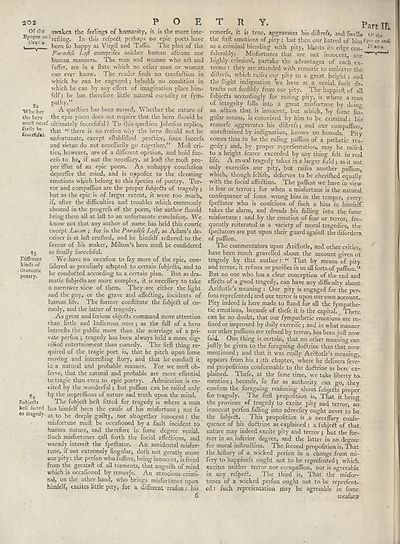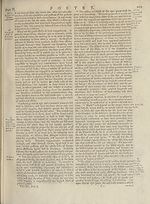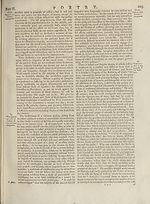Encyclopaedia Britannica > Volume 15, PLA-RAM
(240) Page 202
Download files
Complete book:
Individual page:
Thumbnail gallery: Grid view | List view

202 POE
Of the awaken the feelings of humanity, it is the more inte-
Epopee an.] re{j;jng> jn refpe£t perhaps no epic poets have
. been fo happy as Virgil and TafTo. The plan of the
Pnradife Lojl comprifes neither human actions nor
human manners. The man and woman who aft and
fuffer, are in a flate which no other man or woman
can ever know. The reader finds no tranfaftion in
which he can be engaged ; beholds no condition in
which he can by any effort of imagination place him-
felf; he has therefore little natural curiofity or fym-
pathy.”
Whe her ^ queftion has been moved, Whether the nature of
the hero the epic poem does not require that the hero ffiould be
muft necef ultimately fuccelsful ? To this queftion Johnfon replies,
fuctefAl ^iat ^ t^ere no rea^on w'ay the hero ffiould not be
unfortunate, except eftablilhed praftice, fince fuccefs
and virtue do not neceflarily go together.” Moil cri¬
tics, however, are of a different opinion, and hold fuc¬
cefs to be* if not the necefiary, at leaft the moil pro¬
per iffue of an epic poem. An unhappy conclufion
depreffes the mind, and is oppoiite to the elevating
emotions which belong to this fpecies of poetry. Ter¬
ror and compaffion are the proper fubjefts of tragedy ;
but as the epic is of larger extent, it were too much,
if, after the difficulties and troubles which commonly
abound in the progrefs of the poem, the author ffiould
bring them all at lafl to an unfortunate conclulion. We
know not that any author of name has held this courfe
except Lucan ; for in the Paradife Loft, as Adam’s de¬
ceiver is at laft crufhed, and he himfelf reftored to the
favour of his maker, Milton’s hero muff be confidered
as finally fuccefsful.
We have no- occafion to fay more of the epic, con¬
fidered as peculiarly adapted to certain fubjefts, and to
be condufted according to a certain plan. But as dra¬
matic fubjefts are more complex, it is neceflary to take
a narrower view of them.. They are either the light
and the gay, or the grave and affefting, incidents of
human life. The former conftitute the fubjeft of co¬
medy, and the latter of tragedy.
As great and ferious objefts command more attention
than little and ludicrous ones ; as the fall of a hero
interefts the public more than the marriage of a pri¬
vate perfon tragedy has been always held a more dig¬
nified entertainment than comedy. The firfl thing re¬
quired of the tragic poet is, that he pitch upon fome
moving and intefeftiag fiery, and that he conduft it
in a natural and probable manner. For we muff ob-
ferve, that the natural and probable are more effential
to tragic than even to epic poetry. Admiration is ex¬
cited by the wonderful; but paffion can be raifed only
by the impreffions of nature and truth upon the mind.
The fubjeft befl fitted for tragedy is where a man
has himfelf been the caufe of his misfortune ; not fo
ao tragedy. ag to deeply guilty, nor altogether innocent: the
misfortune muff be occafioned by a fault incident to
human nature, and therefore in fome degree venial.
Such misfortunes call forth the focial affeftiqns, and
warmly interefl the fpeftator. An accidental misfor¬
tune, if not extremely Angular, doth not greatly move
our pity: the perfon who fullers,.being innocent, is freed
from the greatefl of all torments, that anguifh of mind
which is occafioned by remprfe. An atrocious crimi¬
nal, on the other hand, who brings misfortunes upon
himfelfj excites little pity, for a different reafon: his
6
Ss
^Different
Jtinds of
■ dramatic
poetry.
*4
Subjects
iseft fuited
^ Parc IF;
remorfe, it is true, aggravates his diflrefi, and fwells- of the
the firfl emotions of pity ; but then our hatred of himEP°i and.
as a criminal blending with pity, bkmts its edcre con- ry ama
fiderably. _ Misfortunes that are not innocent, nor ""’’""Y'-—1
highly criminal, partake the advantages of each ex¬
treme : they are attended with remorfe to embitter the
diflrefs, which raifes our pity to a great height ; and
the flight indignation we have at a venial, fault de-
trafts not fenfibly from our pity. The happiefl of all
fubjefts accordingly for raifing pity, is where a man
of integrity falls into a great misfortune by doing
an aft ion that is innocent, but which, by fome fin-
gular means, is conceived by him to be criminal: hij:
remorfe aggravates his diflrefs; and our compaffion,.
unreftrained by indignation, knows no bounds. Pity
comes thus to be the ruling paffion of a pathetic tra¬
gedy; and, by proper reprefentation, may be raifed
to a height fcarce exceeded by any thing felt in real,
life. A moral tragedy takes in a larger field; as it not
only exercifes our pity, but raifes another paffion,
which, though felfifh, deferves to be cheriffied equally
with the focial affeftion. The paffion we have in view
is fear or terror; for when a misfortune is the natural,
confequence of fome wrong bias in the temper, every
fpeftator who is confcious of fuch a bias in himfelf
takes the alarm, and dreads his falling into the fame
misfortune: and by the emotion of fear or terror, fre¬
quently reiterated in a variety of moral tragedies, the
fpeftators are put upon their guard againfl the diforders
of paffion..
The commentators upon Ariffotle, and otlier critics,.
have been much gravelled about the account given of
tragedy by that author: “ That by means of pity
and terror, it refines or purifies in us all forts of paffion.’*-
But no one who has a clear, conception of the end and
effefts of a good, tragedy, can have any difficulty about;
Ariflotle’s meaning : Our pity is engaged for the per-
fians reprefented; and our terror is upon our own account..
Pity indeed is here made to Hand for all the fympathe-
tic emotions, becaufe of thefe it is- the capital. There
can be no doubt, that our fympathetic emotions are re¬
fined or improved by daily exercife ; and in what manner,
our other paffions are refined by terror, has been juft now.
find. One thing is certain, that no other meaning can.
juflly be given to the foregoing doftrine than that now
mentioned; and that it was really Ariflotle’s meaning,,
appears from his i_.;th chapter, where he delivers feve-
ral propofitions conformable to the doftrine as here ex¬
plained. Thefe, at the fame time, we take liberty to.
mention; becaufe, fo far as authority can go, they
confirm the foregoing reafoning about fubjefts proper
for tragedy. The firfl propofition is. That it being
the province of tragedy to excite pity and terror, an
innocent perfon falling into adverfity ought never to be
the fubjeft,. This propofition is .a neceflary confe¬
quence of his doftrine as explained: a fubjeft of that,
nature may indeed, excite pity and terror; but the for¬
mer in an inferior degree, and the latter in no degree
for moral inflruftion. The fecond propofitioHis, That
the hiflory of a wicked perfon in a change from mi-
fery to happinefs ought not to be reprefented-j which,
excites neither terror nor compaffion, nor is agreeable
in any refpeft. The third is, That the misfor¬
tunes of a wicked perfon ought not to be reprefent¬
ed: fuch reprefentation may be agreeable in fome.
meafur?
Of the awaken the feelings of humanity, it is the more inte-
Epopee an.] re{j;jng> jn refpe£t perhaps no epic poets have
. been fo happy as Virgil and TafTo. The plan of the
Pnradife Lojl comprifes neither human actions nor
human manners. The man and woman who aft and
fuffer, are in a flate which no other man or woman
can ever know. The reader finds no tranfaftion in
which he can be engaged ; beholds no condition in
which he can by any effort of imagination place him-
felf; he has therefore little natural curiofity or fym-
pathy.”
Whe her ^ queftion has been moved, Whether the nature of
the hero the epic poem does not require that the hero ffiould be
muft necef ultimately fuccelsful ? To this queftion Johnfon replies,
fuctefAl ^iat ^ t^ere no rea^on w'ay the hero ffiould not be
unfortunate, except eftablilhed praftice, fince fuccefs
and virtue do not neceflarily go together.” Moil cri¬
tics, however, are of a different opinion, and hold fuc¬
cefs to be* if not the necefiary, at leaft the moil pro¬
per iffue of an epic poem. An unhappy conclufion
depreffes the mind, and is oppoiite to the elevating
emotions which belong to this fpecies of poetry. Ter¬
ror and compaffion are the proper fubjefts of tragedy ;
but as the epic is of larger extent, it were too much,
if, after the difficulties and troubles which commonly
abound in the progrefs of the poem, the author ffiould
bring them all at lafl to an unfortunate conclulion. We
know not that any author of name has held this courfe
except Lucan ; for in the Paradife Loft, as Adam’s de¬
ceiver is at laft crufhed, and he himfelf reftored to the
favour of his maker, Milton’s hero muff be confidered
as finally fuccefsful.
We have no- occafion to fay more of the epic, con¬
fidered as peculiarly adapted to certain fubjefts, and to
be condufted according to a certain plan. But as dra¬
matic fubjefts are more complex, it is neceflary to take
a narrower view of them.. They are either the light
and the gay, or the grave and affefting, incidents of
human life. The former conftitute the fubjeft of co¬
medy, and the latter of tragedy.
As great and ferious objefts command more attention
than little and ludicrous ones ; as the fall of a hero
interefts the public more than the marriage of a pri¬
vate perfon tragedy has been always held a more dig¬
nified entertainment than comedy. The firfl thing re¬
quired of the tragic poet is, that he pitch upon fome
moving and intefeftiag fiery, and that he conduft it
in a natural and probable manner. For we muff ob-
ferve, that the natural and probable are more effential
to tragic than even to epic poetry. Admiration is ex¬
cited by the wonderful; but paffion can be raifed only
by the impreffions of nature and truth upon the mind.
The fubjeft befl fitted for tragedy is where a man
has himfelf been the caufe of his misfortune ; not fo
ao tragedy. ag to deeply guilty, nor altogether innocent: the
misfortune muff be occafioned by a fault incident to
human nature, and therefore in fome degree venial.
Such misfortunes call forth the focial affeftiqns, and
warmly interefl the fpeftator. An accidental misfor¬
tune, if not extremely Angular, doth not greatly move
our pity: the perfon who fullers,.being innocent, is freed
from the greatefl of all torments, that anguifh of mind
which is occafioned by remprfe. An atrocious crimi¬
nal, on the other hand, who brings misfortunes upon
himfelfj excites little pity, for a different reafon: his
6
Ss
^Different
Jtinds of
■ dramatic
poetry.
*4
Subjects
iseft fuited
^ Parc IF;
remorfe, it is true, aggravates his diflrefi, and fwells- of the
the firfl emotions of pity ; but then our hatred of himEP°i and.
as a criminal blending with pity, bkmts its edcre con- ry ama
fiderably. _ Misfortunes that are not innocent, nor ""’’""Y'-—1
highly criminal, partake the advantages of each ex¬
treme : they are attended with remorfe to embitter the
diflrefs, which raifes our pity to a great height ; and
the flight indignation we have at a venial, fault de-
trafts not fenfibly from our pity. The happiefl of all
fubjefts accordingly for raifing pity, is where a man
of integrity falls into a great misfortune by doing
an aft ion that is innocent, but which, by fome fin-
gular means, is conceived by him to be criminal: hij:
remorfe aggravates his diflrefs; and our compaffion,.
unreftrained by indignation, knows no bounds. Pity
comes thus to be the ruling paffion of a pathetic tra¬
gedy; and, by proper reprefentation, may be raifed
to a height fcarce exceeded by any thing felt in real,
life. A moral tragedy takes in a larger field; as it not
only exercifes our pity, but raifes another paffion,
which, though felfifh, deferves to be cheriffied equally
with the focial affeftion. The paffion we have in view
is fear or terror; for when a misfortune is the natural,
confequence of fome wrong bias in the temper, every
fpeftator who is confcious of fuch a bias in himfelf
takes the alarm, and dreads his falling into the fame
misfortune: and by the emotion of fear or terror, fre¬
quently reiterated in a variety of moral tragedies, the
fpeftators are put upon their guard againfl the diforders
of paffion..
The commentators upon Ariffotle, and otlier critics,.
have been much gravelled about the account given of
tragedy by that author: “ That by means of pity
and terror, it refines or purifies in us all forts of paffion.’*-
But no one who has a clear, conception of the end and
effefts of a good, tragedy, can have any difficulty about;
Ariflotle’s meaning : Our pity is engaged for the per-
fians reprefented; and our terror is upon our own account..
Pity indeed is here made to Hand for all the fympathe-
tic emotions, becaufe of thefe it is- the capital. There
can be no doubt, that our fympathetic emotions are re¬
fined or improved by daily exercife ; and in what manner,
our other paffions are refined by terror, has been juft now.
find. One thing is certain, that no other meaning can.
juflly be given to the foregoing doftrine than that now
mentioned; and that it was really Ariflotle’s meaning,,
appears from his i_.;th chapter, where he delivers feve-
ral propofitions conformable to the doftrine as here ex¬
plained. Thefe, at the fame time, we take liberty to.
mention; becaufe, fo far as authority can go, they
confirm the foregoing reafoning about fubjefts proper
for tragedy. The firfl propofition is. That it being
the province of tragedy to excite pity and terror, an
innocent perfon falling into adverfity ought never to be
the fubjeft,. This propofition is .a neceflary confe¬
quence of his doftrine as explained: a fubjeft of that,
nature may indeed, excite pity and terror; but the for¬
mer in an inferior degree, and the latter in no degree
for moral inflruftion. The fecond propofitioHis, That
the hiflory of a wicked perfon in a change from mi-
fery to happinefs ought not to be reprefented-j which,
excites neither terror nor compaffion, nor is agreeable
in any refpeft. The third is, That the misfor¬
tunes of a wicked perfon ought not to be reprefent¬
ed: fuch reprefentation may be agreeable in fome.
meafur?
Set display mode to:
![]() Universal Viewer |
Universal Viewer | ![]() Mirador |
Large image | Transcription
Mirador |
Large image | Transcription
Images and transcriptions on this page, including medium image downloads, may be used under the Creative Commons Attribution 4.0 International Licence unless otherwise stated. ![]()
| Encyclopaedia Britannica > Encyclopaedia Britannica > Volume 15, PLA-RAM > (240) Page 202 |
|---|
| Permanent URL | https://digital.nls.uk/191903896 |
|---|
| Attribution and copyright: |
|
|---|
| Description | Ten editions of 'Encyclopaedia Britannica', issued from 1768-1903, in 231 volumes. Originally issued in 100 weekly parts (3 volumes) between 1768 and 1771 by publishers: Colin Macfarquhar and Andrew Bell (Edinburgh); editor: William Smellie: engraver: Andrew Bell. Expanded editions in the 19th century featured more volumes and contributions from leading experts in their fields. Managed and published in Edinburgh up to the 9th edition (25 volumes, from 1875-1889); the 10th edition (1902-1903) re-issued the 9th edition, with 11 supplementary volumes. |
|---|---|
| Additional NLS resources: |
|

